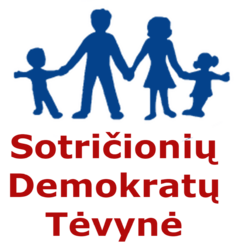Sotirian Democratic Homeland
Sotirian Democratic Homeland Sotričionių Demokratų Tėvynė | |
|---|---|
 | |
| Chairman | Remigijus Balčiūnas |
| Seimas leader | Vytautas Vaidotas |
| Bundestag leader | Remigijus Balčiūnas |
| Founded | 17 June 1940 |
| Headquarters | Lipliškės |
| Ideology | Ruttish regionalism Sotirian Democracy Liberal conservatism Social conservatism Historical National conservatism Anti-communism |
| Political position | Centre-right Historical Right-wing |
| European affiliation | Alliance of Conservatives and Democrats for Euclea |
| Colours | Blue, red |
| Volkstag (Ruttish seats) | 9 / 98
|
| Herrstag (Ruttish seats) | 4 / 42
|
| Seimas | 16 / 125
|
| Euclean Parliament | 1 / 118
|
The Sotirian Democratic Homeland (Ruttish: Sotričionių Demokratų Tėvynė; Weranian: Sotirianisches Demokratisches Heimatland) is a political party in Ruttland, operating exclusively in the province. Historically the most prominent party in the province, the SDT is a centre-right Sotirian democratic party that has served in the regional and federal government several times.
The SDT was created in 1940 as the Ruttish Sotirian Democratic Party (RSDP) when the Weranian government ended Weranicisiation policies in the province and instead promoted the formation of an anti-socialist political force. The SDT gained strong support from the Catholic Church and Ruttish peasants, promoting linguistic equality between Ruttish and Weranian and a strong Ruttish identity within Werania. The SDT dominated the politics of the provinces from the 1930's to 1970's where it was regarded as a staunchly right-wing party; it lost power however to socialists and social democrats during the 1970's as rural to urban migration weakened its support base of conservative farmers'. The SDT would return to power in Ruttland in the 1990's where it promoted economic liberalism; it would hold government again in the province in the late 2000's. Since the mid-2010's the SDT has been one of the three largest parties in Ruttland alongside the social democratic Social Democratic Radical Party-Labour Union and the National Coalition for Independence.
The SDT has traditionally proven flexible in its support for other parties, supporting right-wing, centrist and centre-left governments on a provincial and federal level. This has often given the SDT an outsized influence in Weranian politics, particularly on social issues which the party's conservative views being influential in Weranian legislation.